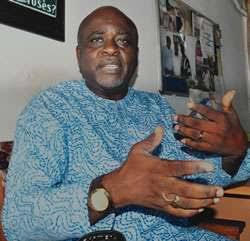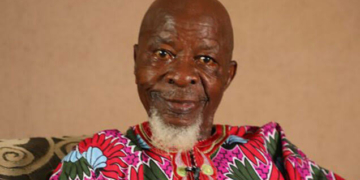Fosudo
Veteran actor, Prof. Sola Fosudo, tells OLUSHOLA RICKETTS about his early days in Nollywood, what made him pursue a career in academics and his concerns for the movie industry
When you were younger, did you imagine you’d become a professor?
I believe that, as an individual, your aim is to get to the top of your profession; but at the end of the day, everything depends on divine providence. If 30 people are employed as accountants, only one person might end up becoming a chief accountant. We all wish that the best comes to us.
To be promoted as a professor is a mark of honour. It is a call to greater contribution in my place of primary assignment and also to the society. It is similar to becoming a governor or president and when you occupy any of such positions, it is a call to bigger responsibilities.

Would you say it was easy for you to attain professorship?
Professorship is not a political position that people fight for or seek elections to. There are criteria for evaluating the application of anyone for a position in the university. When you have the needed number of publications to apply for a position, you will apply and it will go through necessary procedures. Once you are qualified, you will be appointed as a professor.
When did you start focusing more on academics?
I think in everything one does in life, there is the hand of God in it. Though I started as a theatre practitioner, at some point, I saw an advert where the English Language Department of the Lagos State University, Ojo, was looking for a lecturer who had a background in theatre arts and I applied. Then, I was not just an actor; I was directing and producing plays both on stage and screen. I had already produced about four video films as of then.
I applied to LASU, passed the interviews and was employed. But when I joined LASU in 1994, some people felt I was unserious or insane. I was already earning N150, 000 to appear in movies. I had featured in popular movies like Glamour Girls, True Confession and a host of others. However, when I joined LASU as a Lecturer 2 in 1994, my salary was N5,000.
A few years after joining LASU, I was instrumental to the establishment of the Theatre Arts Department. I joined the English Language Department, but I later applied to the Department of Theatre Arts, which started in 2001. For me, this is a major achievement as many students have passed through the department.
Why did you leave acting for lecturing?

I was happy with the industry at the time I moved to LASU, but I have always looked forward to growth and I knew LASU would be a platform for me to make a bigger contribution to the development of theatre in Nigeria. Development theatre in Nigeria should not be only through films but also by training people.
Even before I went to study theatre arts, I was a professional teacher. I love teaching and reading. So, when I saw the lecturing advert, I was attracted by the fact that a theatre person was needed.
How did you cope with N5,000 as salary at LASU?
I was not bothered about the salary because I was still acting until years later when I became busier with the school job. For the first few years as a lecturer, I was still getting some additional income from productions.
Meanwhile, it is incorrect to say I have left acting for lecturing. I am doing the two and I am not the only one doing this. We have many lecturers who are in the university and are also theatre practitioners. We call them scholar-artistes. For me, it means one is relevant both in theory and practice. We can be practitioners in different ways, but most people recognise actors better because they are always on television. This does not mean other practitioners are not playing their roles well.
Do you at times miss your days as a leading actor?
How can I miss those days? Those days are gone and I am enjoying the days I have now. I am happy where I am now because God is using me to touch lives. Can you tell me what I should miss about acting in Glamour Girls or other movies I had featured in? Is it the fame or popularity? I am not attracted to fame; it does not mean anything to me. Though it is good when one is popular for his or her work, it is not the most important thing. I am fulfilled touching lives, and seeing my ex-students do great things gives me joy.
When was the last time you went on location?
I still go to locations frequently. I am even producing a TV series for a bank now, which started last year. Titled Setting Up, it is showing in five stations including LTV 8, NTA Kano and NTA Ilorin. I am part of a series, Forbidden, which is presently running on African Magic. I am still recording and I have recorded several Yoruba movies. Two years ago, I was on the set of Arbitration, a cinema movie. I was part of the cast in So Wrong So Wright for many years before I left in 2012. I am still making my own contribution to Nollywood as much as I can.
I am aware that I cannot be 100 per cent available any longer for movies, but my lecturing job is also not for 24 hours daily for seven days. I am entitled to holidays and I am free to do whatever I want to do on weekend.

What are your concerns for the industry?
The first is the lack of facilities and I have discussed this in a few places when I had an opportunity. In America and India, where the concept of ‘wood’ came from, they have physical locations for their Hollywood and Bollywood, respectively. In these places, they have studios where filmmakers make movies; but we don’t have anywhere like that in Nigeria. I don’t even know if Nollywood is a philosophy or concept. It is high time we had a place for Nollywood, where there will be studios and houses for practitioners. If we want to shoot a film in Nigeria, we beg people to give us their houses, and after a while, they chase us out. So, in Nigeria of today, with the position of the movie industry, we ought to have a permanent location.
We also need to train practitioners as most people are unschooled in film and television production. Most of our universities don’t even have a film department where students can be trained in film production, theory and practice. Today’s actors study geography, chemistry, biology, accounting and other courses, which are not related to acting. We need dedicated institutions to train people in film production in Nigeria. If they want to annex film studies with the theatre, it should be done properly.
Finding a solution to some of these problems is in the hands of the different associations as an individual cannot fight it alone. But in my school, we have proposed to the university to create a separate department for film studies. They have allowed us to start with a diploma degree in film studies under theatre arts. We have started but only have a few students.
Which movie is your favourite and why?
All of the productions I have done are wonderful and have different areas of strength. Also, the response of the audience varies. But I know a lot of people still talk about my roles in True Confession and Glamour Girls. I also believe Playing Games by Tade Ogidan and Rituals made huge impacts upon their release. Personally, however, I am in love with Ripples because it ran for many years. I also cherished the moments while on the set of Village Headmaster.
Do you have a child who has followed your path?
My son, Temilolu Fosudo, just finished his master’s degree in Theatre Arts at the University of Ibadan. He is a writer and actor who has published some plays. I have a daughter who is also studying theatre arts. My son in the United Kingdom also does one or two things in the arts. So, theatre is in the blood in a way.
How many children do you have?
I don’t need to tell you the number of children I have. But I have children who are not into entertainment as well. I have a child who is a mechanical engineer.
How do you combine what you do and your role as a father?
We play different roles in different situations in life. Do I live at LASU? Don’t I close from work? When I close, I go to my house and play my role to my family. When I am at work, I play my role to my students as well.






Discussion about this post